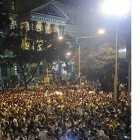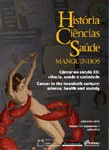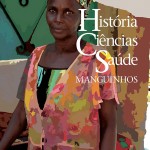July 8th, World Oceans Day
The ocean covers over 70% of the planet. In 2014, HCS-Manguinhos published the dossier Oceans and seas: history science, policy (v.21, n.3, jul.-set. 2014) about the history of our oceans and policies about them.
It features eleven articles ranging from reports written by Captain Robert FitzRoy, from HMS Beagle, during his trip to Brazil, to the myth of the Kraken, a “monster” that haunted sailors between Norway, Iceland, and Greenland.

HCS-Manguinhos (v.21, n.3, jul.-set. 2014) Photo: Vasco da Gama Aquarium, Lisbon, Portugal.
This issue starts with an article about the German scientist Hermann von Ihering, who arrived in Brazil in 1880. It covers his theories on land bridges, which would connect South America and Africa. The authors emphasize the social and scientific networks built by Von Ihering, who published a book about the history of the Atlantic Ocean in 1927.
The article about the writings of Robert FitzRoy shows impressions of the HMS Beagle commander about the Brazilian cities he visited between 1828 and 1839, such as Rio de Janeiro e Salvador. These reports, far less known than those of Charles Darwin, who traveled in the same vessel, show enthusiasm for tropical landscapes and criticize its inhabitants, described by Fitz Roy as inefficient and culturally backward.
The text The Kraken: when myth encounter science talks about the figure of the Kraken, described as a sea monster in a manuscript of 1180, written by Brazilian researchers working in Germany and the Netherlands. With more than 18 meters, the creature haunted North European sailors and was later identified as giant squid. The paper investigates the role that the Architeuthis (the scientific name of this animal) still plays in mythology and science.
The article, The astrolab, the sea and the empire analyzes writings by Portuguese cosmographers between the 16th and 18th centuries to demonstrate the technical and scientific bases which allowed European maritime expansion. Another paper is about the constitution of aquariums over time, focusing on the educational role these places have played in recent years.
This issue also features two articles on marine studies in a Portuguese context. The first deals with institutions and research about the sea in Portugal in the 20th century. The other addresses the oceanographic practice and the iconographic collection of King Dom Carlos I. In this issue, there are also essays discussing different topics, such as the study of the Argentine marine fauna between 1890 and 1930; an article about the American geologist John Casper Branner on the northeastern Brazilian coast, the Oceanographic Institute of the São Paulo University; and a study on Brazilian marine biodiversity.
The Images section discusses the role of underwater photography in the research on marine life. The essay describes the experience of North Americans and Europeans, particularly the experiences undertaken by biologists Boutan Louis and Jacob Reighard in a study conducted between 1890 and 1910. The Sources section discusses the research of the biologist Joséphine Schouteden- Wéry on the Belgian coast. Several times in Congo, she did field work and played a prominent role in the Union des Femmes Coloniales.
Read in HCS-Manguinhos:
Water and global health In the 1980s, the UN implemented two large projects to guarantee sanitation and clean water for the population. This article by Christian McMillen, Professor of the Department of History at the University of Virginia, examines both programs.
Deep waters To celebrate World Water Day, we selected articles about seas, oceans, and rivers as subjects of history.
Basic sciences for sustainable development Luc Allemand, secretary general of the IYBSSD 2022: “Where clean water is guaranteed at the tap, you can thank chemists and microbiologists.”
The study of the sea in Portugal addresses the institutionalization of marine biology in Portugal at the beginning of the 20th century, which included the creation of scientific research institutes and public aquariums.
A review of environmental historiography on Brazil This overview of books on Brazilian environmental history includes topics such as forests, agriculture, biodiversity, urban dynamics, and environmentalism.
Investigar en tiempos de pandemia: archivos digitales para la historia de la agricultura y el medioambiente “En vez de ver la investigación digital como una alternativa inferior a la investigación histórica tradicional — algo para hacer ‘mientras tanto’— debemos verla como una oportunidad para explorar nuevos tipos de proyectos.” Stuart McCook, profesor de historia en la Universidad de Guelph, presenta algunas colecciones digitales sobre temas que van desde la historia del cultivo del cafe y de la cana de azúcar hasta la biodiversidad a nivel mundial.
The politics of climate change examines the political dimension of processes of climate knowledge production.
Expeditions and discoveries in the modern age Online collection from Harvard University delivers maps, photographs, and documents on selected expeditions between 1626 and 1953.
The Conrad Martens sketchbooks The drawings and watercolors made during the expedition of Charles Darwin to South America (1833-1835) are available at Cambridge Digital Library.








